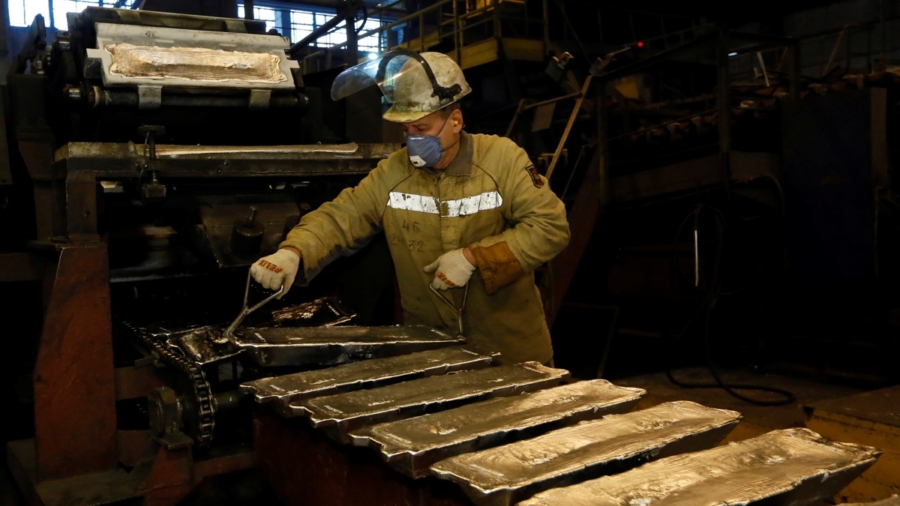WASHINGTON/MOSCOW—U.S. President Donald Trump’s administration lifted sanctions on Jan. 27 on the core empire of Russian tycoon Oleg Deripaska, including aluminum giant Rusal and its parent En+, despite a Democrat-led push to maintain them.
The move, which sent the Russian stock index to an all-time high, has watered down the toughest penalties imposed since Moscow’s 2014 annexation of Crimea, following a lobbying campaign in the United States that lasted almost 10 months.
Hong-Kong listed shares in Rusal, the world’s largest aluminum producer outside China, hit their highest since April on Jan. 28, rising 9 percent.
Aluminum prices on the London Metal Exchange (LME) dropped as much as 1.4 percent after the open. The sanctions had sent London aluminum to a seven-year high when they were announced in April last year amid fears of a supply squeeze.
On Jan. 28, the LME said it had lifted its suspension on storing Rusal-produced metal in LME-approved warehouses with immediate effect.
“Members may freely enter into contracts with Rusal and its affiliates,” the LME said in a statement.
Disputed Decision
The decision to lift the sanctions, imposed by the U.S. Treasury in response to what it called Russia’s “malign activities”, defied a Democratic-led push in the U.S. Congress to maintain the restrictions.
Earlier this month, Democrats were joined by 11 of Trump’s fellow Republicans in the U.S. Senate in an effort to keep the sanctions on Rusal, En+ Group and power firm JSC EuroSibEnergo.

Advocates for keeping the sanctions had argued that Deripaska, an ally of Russian President Vladimir Putin, retained too much control over the companies.
But in its statement on Jan. 27, the U.S. Treasury Department said the three companies had reduced Deripaska’s direct and indirect shareholding stake and severed his control.
That action, it said, ensured that most directors on the En+ and Rusal boards would be independent, including Americans and Europeans who had no business, professional or family ties to Deripaska or any other person designated for sanctions.
It added that the companies had agreed to “unprecedented transparency for the Treasury into their operations” including extensive auditing, certification and reporting requirements.
Deripaska himself remains subject to U.S. sanctions.
Changes in Rusal, EN+
After the Treasury announcement, Rusal said its chairman, Jean-Pierre Thomas, had resigned as part of the deal to lift the U.S. sanctions.
Its parent company, En+ Group, also announced the resignation of several of its board members and the appointment of new directors, a move intended to satisfy U.S. Treasury demands that the boards of both Rusal and En+ Group be made up of independent directors.
“The new board of directors will take additional actions … to demonstrate the board’s absolute commitment to transparency, accountability and good corporate governance,” En+’s board chairman Greg Barker said in a statement.
These will include the establishment of a separate board committee for compliance and the retention of an independent expert counsel to advise the board, Barker said.
In addition, En+ announced that Swiss company Glencore would swap shares in Rusal for a direct ownership interest in En+.
Trump administration officials, and many Republicans who had supported lifting the sanctions, had said they were worried about the effect on the global aluminum industry. Rusal is the world’s largest aluminum producer after China’s Hongqiao.
They also said Deripaska’s decision to lower his stakes in the companies so that he no longer controlled them showed that the sanctions had worked.
Canada Exempt?
The premium for shipping to the United States stands at around $0.19 a lb or $420 a tonne, double the $200 a tonne seen at the start of 2018 and about 20 percent above the levels at the time tariffs were announced in early March 2018.
U.S. premium contracts show a decline to $350 a tonne by July 2020, a level producers say is needed to attract aluminum to the United States.
The United States is a major consumer of aluminum. It is expected to account for 5 million to 6 million tonnes of demand this year in a market estimated at 68 million tonnes.

Rusal supplied only around 10 percent of the U.S. aluminum market in 2017. Canada, with a share of more than 50 percent, is the largest supplier.
If, as some expect, tariffs are lifted or Canada is exempted or gets quotas, premiums could fall much further.
“Any deal with Canada would allow 2.5 million tonnes of primary aluminum to enter the U.S. duty-free and significantly dilute the proportion of U.S. imports from duty-paid countries,” Wood Mackenzie analysts said in a note.
For European consumers, premiums at $69 a tonne, down nearly 60 percent since early May, are expected to slide due to high stocks of aluminum held by traders in the region.
By Patricia Zengerle, Polina Ivanova, and Pratima Desai

